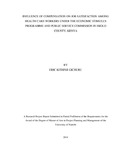| dc.description.abstract | Job satisfaction is one of the most significant variables in organisational behaviour and in
work organisations. It is one of the most important factors determining the quality of
work, productivity, turnover and organisational performance. Job satisfaction is said to be
associated with working conditions, time pressure, opportunities for career development,
management support, compensation and promotional policies of the organizations. Health
care workers like other employees need to be well compensated in order to make them
more satisfied with their jobs, thus reducing turnover intentions while improving the
quality of service. The purpose of this study was to determine the influence of
compensation on job satisfaction among healthcare workers under the Economic
Stimulus Programme and Public Service Commission in Isiolo County, Kenya. This
study was guided by the following objectives: To determine the influence of direct
financial compensation, indirect financial compensation and non-financial compensation
on job satisfaction among health care workers. To achieve these objectives a crosssectional
research design was adopted where all 49 health care workers employed under
the ESP and the 132 health care workers employed under the PSC were sampled through
a census approach and stratified sampling respectively. 14 respondents in key positions in
both ESP and PSC participated in the in-depth interview while 157 health workers filled
in questionnaires. The two research instruments were tested for validity and reliability
through a pilot study conducted on 5 health workers under the ESP and 10 under the
PSC. Both descriptive and inferential statistics were used in the analysis with the help of
Statistical Package for Social Scientists (SPSS).Data was reported using percentages and
frequencies to establish the relationship between compensation and job satisfaction and to
present the datain form of tables and themes. The study found out that majority of the
health care workers were dissatisfied with compensation offered to them with those from
the Economic Stimulus Programme being more dissatisfied especially with timely
payment of their salaries, take home payment and other aspects of direct, indirect and
non-financial compensation henceemployees should be well compensated and have
financial and non-financial compensations that are commensurate to their qualifications,
experience and performance in order to boost their job satisfaction and finally improve
productivity. There should be timely payment of salaries with consistent pay policies;
administration of payment in a manner that is convenient to employees; employers should
offer a pay rise that is satisfactory and that makes a positive impact on the employees’
motivation and satisfaction. It is also recommended that the employers ensure their
employee’s payment is equitable to other players in the sector and that there is a
perception of fairness within the organisations. | en_US |

